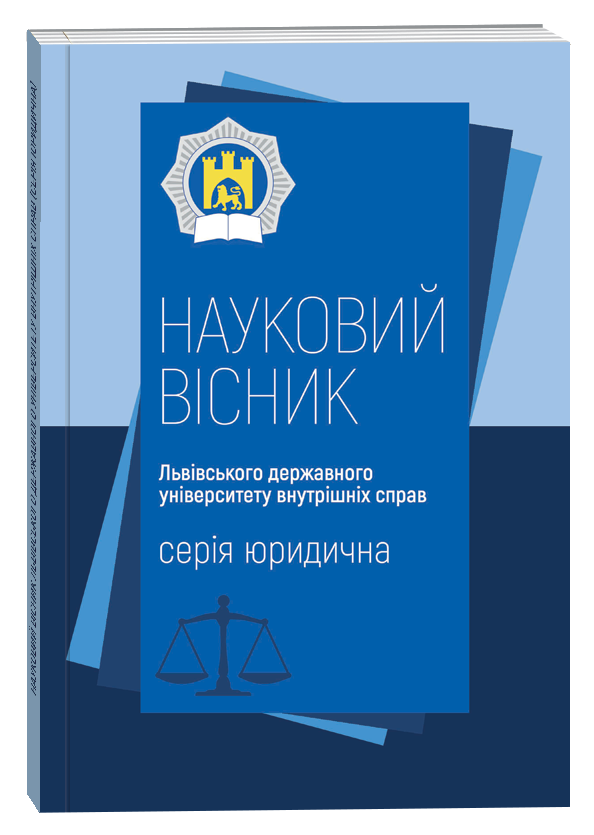IMPOSSIBILITY TO FULFILL OBLIGATIONS AS A BASIS FOR EXEMPTION FROM CONTRACTUAL LIABILITY
DOI:
https://doi.org/10.32782/2311-8040/2024-4-1Keywords:
obligation, impossibility of fulfilling an obligation, termination of binding legal relations, contract, exemption from contractual liability, force majeure, circumstances of force majeureAbstract
The article is devoted to the theoretical development of the category «impossibility of fulfilling obligations», highlighting its features. The opinion is expressed that the category «impossibility of fulfilling obligations» is a complex legal category that describes situations in which the parties cannot fulfill their contractual obligations due to the occurrence of circumstances for which the parties are not responsible. The foreign law enforcement practice is analyzed, in which there is a clear division of such impossibility of fulfilling obligations into initial impossibility, which involves such impossibility before the conclusion of the contract, and subsequent impossibility, which occurs after the beginning of the performance of the contract. The relationship between the category of impossibility to fulfill obligations and force majeure as a basis for exemption from contractual liability is investigated. Their relationship is substantiated in the logical «cause-effect» relationship, where force majeure serves as a circumstance in which the fulfillment of an obligation becomes impossible due to objective factors, and as a result leads to the termination of the binding relations of the parties. The author singles out certain differences of the specified categories: the impossibility of fulfilling the obligation due to the established fact of the objectivity of the event that occurred, the absence of a subjective factor (the fault of the debtor/party to the contract) and the cause-and-effect relationship between these elements leads to the termination of the obligation friendly relations. In turn, force majeure is the basis for the release of the party to the contract from the occurrence of adverse consequences, provided that the main obligation is not terminated, but only its fulfillment is postponed, unless the contract provides otherwise. That is, upon the occurrence of force majeure circumstances, there is a transformation and adaptation of the binding legal relationship in accordance with the situation that has arisen, which may consist, in particular, in the suspension of the contractual legal relationship for the period of existence of the specified circumstances.
References
Цивільний кодекс України : Закон України від 16.01.2003 № 435-IV. / Верховна Рада України. Відомості Верховної Ради України. 2003. № 40. Ст. 356.
Сенін Ю.Л. Новація як спосіб припинення зобов’язань за цивільним законодавством України: автореф. дис. канд. юрид. наук : 12.00.03. Одеса: НУ «ОЮА», 2013.20 с.
Халабуденко О.А. Речові права. Книга 2. Зобов’язальне право. Кишинів: Міжнародний незалежний університет Молдови, 2014. 488 с.
Продаєвич І.С. Припинення зобов’язання неможливістю його виконання : автореф. дис. канд. юрид. наук: 12.00.03. Одеса, 2009. НУ «ОЮА», 19с. URL: https://dspace.onua. edu.ua/server/api/core/bitstreams/b09dc461-da5b-4b93-b955-a274c0a4f65c/content.
Коструба А.В. Теоретичні аспекти припинення договірних зобов’язань у цивільному праві України. Право України. 2017. Вип. 7. С. 109–123. URL: https://hal.science/hal-02532737v1.
Міхно О.І. Припинення договору за цивільним законодавством України : автореф. дис. канд. юрид. наук: 12.00.03. Київ, 2007. 26 с.
Постанова Верховного Суду від 11 липня 2023 року у справі №910/18432/21. URL: https://reyestr.court.gov.ua/Review/112173165.
Заіка Ю.А., Тімуш І.С., Лов’як О.О. Українське цивільне право. Київ : Центр учбової літератури, 2014. 358 с.
Kaufmann H. Christian Wollschläger Die Entstehung der Unmöglichkeitslehre. Zur Dogmengeschichte des Rechts der Leistungsstörungen. 1971. Vol. 88. No 1. P. 518–526. URL: https://www.degruyter.com/document/doi/10.7767/zrgra.1971.88.1.518/pdf.
French Civil Code / trans. from French Cartwright J., Fauvarque-Cosson B., Whittaker S., 2016. URL: https://www.trans-lex.org/601101/_/french-civil-code-2016/.
Судова справа «Taylor v Caldwell», 3 B&S 826, 1863. URL: https://www.lawteacher.net/cases/taylor-v-caldwell.php.
Berger K., Behn D. Force Majeure and Hardship in the Age of Corona: A Historical and Comparative Study. McGill Journal of Dispute Resolution. 2019–2020. Vol. 6. № 4. P. 78–130. URL: https://mjdrrrdm.ca/files/sites/154/2020/07/Berger-and-BehnForce-Majeure and-Hardship-in-the-Age-of-Corona-1.pdf.
Codice Civile. REGIO DECRETO 16 marzo 1942, n. 262. Approvazione del testo del Codice civile. (042U0262) (GU Serie Generale n.79 del 04-04-1942) URL:https://www.gazzettaufficiale.it/dettaglio/codici/codiceCivile.









